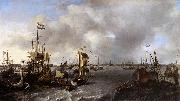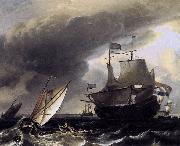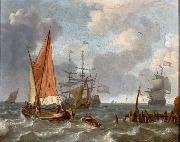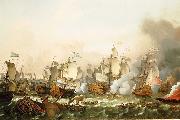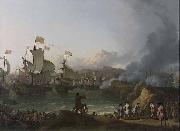Ludolf Bakhuizen Huiler la Reproduction de TableauAll Ludolf Bakhuizen Oil Paintings(December 28, 1630 - November 17, 1708) was a German-born Dutch Golden Age painter who was the leading Dutch painter of maritime subjects after the two Willem van de Veldes (father and son) left for England in 1672. He was born in Emden, East Frisia, and came to Amsterdam in about 1650, working as a merchant's clerk and a calligrapher. He discovered so strong a genius for painting that he relinquished the business and devoted himself to art from the late 1650s, initially in pen drawings. He studied first under Allart van Everdingen and then under Hendrik Dubbels, two eminent masters of the time, and soon became celebrated for his sea-pieces, which often had rough seas. He was an ardent student of nature, and frequently exposed himself on the sea in an open boat in order to study the effects of storms. His compositions, which are numerous, are nearly all variations of one subject, the sea, and in a style peculiarly his own, marked by intense realism or faithful imitation of nature. In his later years Bakhuizen employed his skills in etching; he also painted a few examples each of several other genres of painting, such as portraits, landscapes and genre paintings. |
|||

|
|||
|
|
|||
|
||||||||||||
| Ludolf Bakhuizen (December 28, 1630 - November 17, 1708) was a German-born Dutch Golden Age painter who was the leading Dutch painter of maritime subjects after the two Willem van de Veldes (father and son) left for England in 1672. He was born in Emden, East Frisia, and came to Amsterdam in about 1650, working as a merchant's clerk and a calligrapher. He discovered so strong a genius for painting that he relinquished the business and devoted himself to art from the late 1650s, initially in pen drawings. He studied first under Allart van Everdingen and then under Hendrik Dubbels, two eminent masters of the time, and soon became celebrated for his sea-pieces, which often had rough seas. He was an ardent student of nature, and frequently exposed himself on the sea in an open boat in order to study the effects of storms. His compositions, which are numerous, are nearly all variations of one subject, the sea, and in a style peculiarly his own, marked by intense realism or faithful imitation of nature. In his later years Bakhuizen employed his skills in etching; he also painted a few examples each of several other genres of painting, such as portraits, landscapes and genre paintings. |
||||||||||||
|
|
||||||||||||
| ID de tableau:: 78997 View of Amsterdam with Ships on the Ij View of Amsterdam with Ships on the Ij 1666(1666) Medium Oil on canvas cyf 1666(1666) Medium Oil on canvas cyf |
||||||||||||
|
|
||||||||||||
| ID de tableau:: 82700 Dutch Vessels on the Sea at Amsterdam Dutch Vessels on the Sea at Amsterdam 1708(1708) Medium Oil on canvas cyf 1708(1708) Medium Oil on canvas cyf |
||||||||||||
|
|
||||||||||||
| ID de tableau:: 82987 Seascape Seascape Date 17th century Medium Oil on canvas Dimensions 44.5 x 55.2 cm (17.5 x 21.7 in) cjr Date 17th century Medium Oil on canvas Dimensions 44.5 x 55.2 cm (17.5 x 21.7 in) cjr |
||||||||||||
|
|
||||||||||||
| ID de tableau:: 92763 The Battle of Barfleur, 19 May 1692 The Battle of Barfleur, 19 May 1692 1693(1693) Medium oil on canvas Dimensions 158.5 X 234.5 cm (62.4 X 92.3 in) cjr 1693(1693) Medium oil on canvas Dimensions 158.5 X 234.5 cm (62.4 X 92.3 in) cjr |
||||||||||||
|
|
||||||||||||
| ID de tableau:: 94898 Battle of Vigo Bay Battle of Vigo Bay 1702 (1702) Type Oil on canvas Dimensions 48.3 cm x 68.6 cm cyf 1702 (1702) Type Oil on canvas Dimensions 48.3 cm x 68.6 cm cyf |
||||||||||||
|
|
||||||||||||
| Artiste précédent Artiste prochain | ||||||||||||
|
|
||||||||||||
|
Ludolf Bakhuizen (December 28, 1630 - November 17, 1708) was a German-born Dutch Golden Age painter who was the leading Dutch painter of maritime subjects after the two Willem van de Veldes (father and son) left for England in 1672. He was born in Emden, East Frisia, and came to Amsterdam in about 1650, working as a merchant's clerk and a calligrapher. He discovered so strong a genius for painting that he relinquished the business and devoted himself to art from the late 1650s, initially in pen drawings. He studied first under Allart van Everdingen and then under Hendrik Dubbels, two eminent masters of the time, and soon became celebrated for his sea-pieces, which often had rough seas. He was an ardent student of nature, and frequently exposed himself on the sea in an open boat in order to study the effects of storms. His compositions, which are numerous, are nearly all variations of one subject, the sea, and in a style peculiarly his own, marked by intense realism or faithful imitation of nature. In his later years Bakhuizen employed his skills in etching; he also painted a few examples each of several other genres of painting, such as portraits, landscapes and genre paintings. |
||||||||||||
|
|
||||||||||||
|
CONTACTER DES Etats-Unis |





